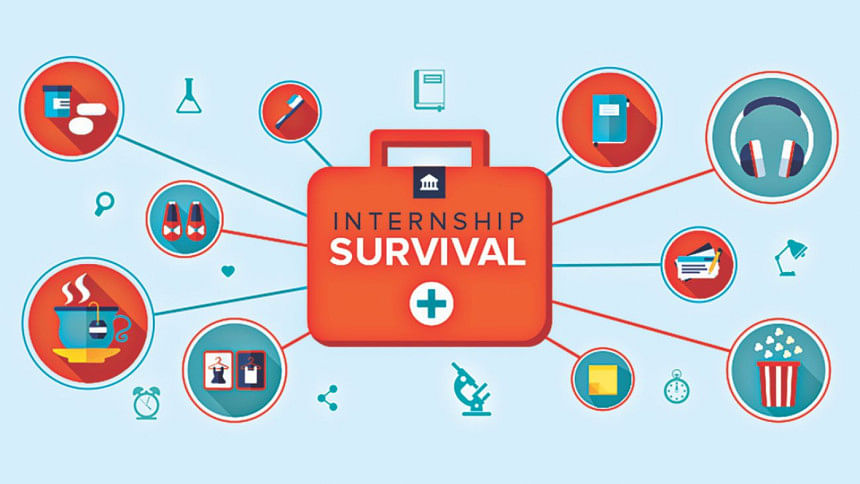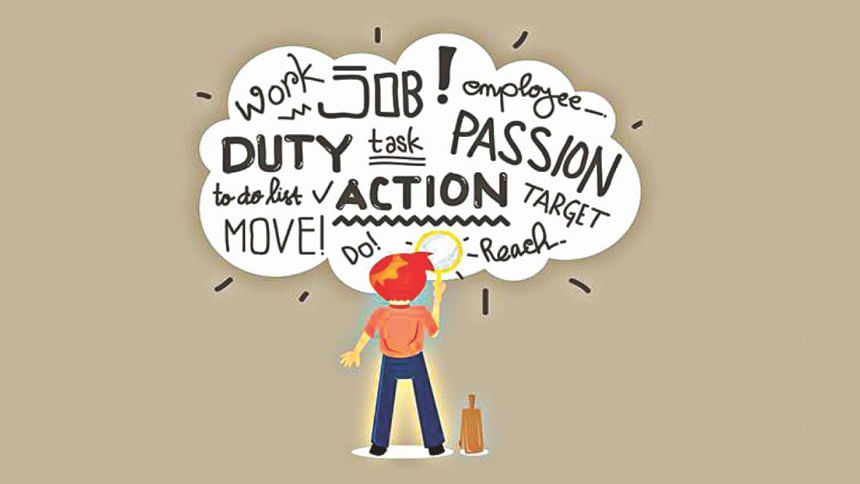Internship Survival Guide

An internship gives you the opportunity to get a glimpse of what it will be like in your future chosen field of work. It is more than just a job, rather an experience that moulds you and betters you to possess all kinds of skills necessary to prosper in your career. However, choosing the right time for an internship in the right place is of utmost importance and is a decision that shouldn't be made lightly.
When to start looking?
Most students are seen taking up internship opportunities during the third and fourth years of their undergraduate university lives. When asked why, Ritu Progga Saha, a third year student at BUET, said "Core major-related courses were taught third year onwards and that resulted in more experienced number of students ready to take on internships in the real world." However, first and second year students could just as easily get a head-start at launching their career with a part-time internship and brush up on communication and time management skills in the process. One downside however, is that they may not have as much of a clear career plan mapped out and interests may not be defined yet.
Another decision making criteria would be between summer (full-time or part-time) and academic (part-time) internships. Here, the obvious advantage for summer internships is that a full-time experience gets you to live the 9-5 schedule and adapt to its ways at an early stage. Part-time internships are often more stressful, as juggling work and academics could pose as quite an ordeal, however you might learn precious time management skills out of this type of job.

Where to look?
The benefit of working at big firms is the obvious brand recognition points that you gain through the presence of the internship experience in your CV. However, mid to small sized firms offer a more hands-on experience, giving you more opportunities to learn by performing various work duties and building stronger interpersonal relationships with your peers and supervisors. "Working at Career Solutions helped me network with a wide array of people and enabled me to communicate one-on-one with my supervisors and peers," said Fariha Amber from NSU. Moreover, interning at big firms could often mean less relevant work and more coffee fetching, low number of assigned work due to confidentiality issues, and an overall impersonal environment which is exactly what Wasiq Ahmed, a student of IBA, DU, had to face during his internship at Deloitte. "However, if you have the intention to learn, work-shadowing your supervisors can help you gain some useful skills." he added. The third option, startups, could be more suitable for students looking to play a more integral role during the course of their internship. "The workload was a bit overwhelming at first but after some time spent getting used to it, it was worth it simply because of the scale at which I got exposed to the practical world," said Nafis Khandakar from NSU when asked about his time at AlterYouth, a startup of Grameenphone.
Even though there is usually an absence of a well-defined internship structure at companies in Bangladesh, some have structured internship opportunities, including Grameenphone, with its paid internship program for graduates while unstructured internships at Deloitte, Nestle and Unilever are popular among third and fourth year students. There is also an increasing number of consultancy firms like LightCastle Partners and startups including AlterYouth which provide such opportunities. Lastly, various others including 10 Minute School, Youth Opportunities, etc. have become a prominent platform for students to engage in part-time.

How to Apply?
Some firms often post internship offers on their website or social media page. These come with clear guidelines as to how and when to apply for the job and provide relevant details and requirements of the post itself. Another way could be to use the Youth Opportunities website to find opportunities and follow application procedures which are mentioned along with a link to the original website of the firm in question. When asked about the hiring process, Maliha Iqbal, from the hiring team at Youth Opportunities, replied, "My colleagues and I sit with different departments of the organisation and make a list of what we want from the interns. Once the requirements are set based on the needs, we set out a notice and interview applicants. The key judgement areas include their work interests, knowledge about YO, and alignment of the interviewee with our team values." She also added that they accept open applications too for certain hires. LinkedIn also poses as an efficient way of finding connections to a company of your interest and finding information you need by reaching out to the Human Resource personnel or directly people from your field of interest. Make sure to send in a formal email with an updated resume clearly stating the purpose of your inquiry to the recipient. Lastly, peer and family connections and referrals often help land internship jobs especially in firms with no established internship structure.

What skills do you need?
Even though internships are learning experiences, a set of common minimal skills are recommended which boost the likeliness of getting accepted as an intern. Almost every firm looks for applicants who meet the basic Microsoft Office skills requirements, mostly focusing on Word, PowerPoint, and Excel at variegated degrees. Some jobs may require prior knowledge from courses such as Human Resource Management, Marketing, or Accounting depending on the line of work you choose. However, soft skills are often given more priority by employers as hard skills are easier to train interns through work. When asked what criteria applicants are judged on, Marcus Cornelius Gomes, Executive Vice President and Head of HR at Mutual Trust Bank, replied, "After the initial academic qualifications and hard skills are met, companies mostly focus on soft skills including creativity, mental alertness, and likelihood of taking initiative. Presentation and verbal communication skills are key judgement criteria to be fulfilled as well." Other soft skills may include- interpersonal skills, patience, time management, public speaking, leadership, and the ability to work in a team. With the ever changing work environment, it is important to consider providing the employers with a diverse skillset with the right mix of soft and hard skills incorporated into your resume.
What are some common obstacles you may face?
The obvious one would be work-life balance as making a fool proof schedule- fitting classes, work, and social life is not that easy to carry out in real life. Moreover, the busy Dhaka streets contribute to increased commute time and this can be particularly troublesome if your workplace is far away from your home. "Time and distance were an issue while working 9-5, however I just got used to it" said Naomi Musleh, a third year student at IBA, DU about her time interning at Mashreq Bank. The workload could also seem overwhelming at first, especially while having to juggle with studies. The wide range of people you meet and have to deal with in the job also poses as an obstacle for many. "Coping with an environment consisting of a bunch of 30 year olds to whom it's a regular day at work was cumbersome for a newbie like me. Moreover, meaningful interactions with individuals were hard to engage in as my job wasn't a long-term one," said Shadman Karim from NSU about his experience at BATB. However, overcoming this helps you obtain a sense of tolerance and ability to work better in teams. Lack of experience at your first internship or at a new field of work may seem pretty daunting. This is exactly what Aaqib Hasib, currently a student at BRAC University, faced while interning at GIZ Bangladesh. He added, "Hired as an English Trainer, I had to train lower level employees in their 30s-40s who were reluctant to respect me as an instructor as I was merely an inexperienced A level kid in their eyes." An important point to note is that a large part of overcoming work related obstacles depend on the supervisors and colleagues you end up working with. "Even though I didn't have prior work knowledge, the team I worked with was very patient with me and gave relevant detailed feedback which enabled me to improve and learn from my mistakes" said Ishraq R Rahman, a third year student at BUET who worked at Backpack BD.

What do internships teach you?
The takeaways from an internship are often a mixture of specific skills relating to the line of work you did and some common soft/hard skills. It could pose as an eye-opening experience, where you learn new things about your department and often clear out misconceptions you had about it from before. For instance, bank jobs may seem boring to you until you work in one and realise how different the various departments can be. At the same time, it could act as a reaffirming system, establishing your beliefs of a job to be true. Internship experience proved to be very helpful for Rageeb Kibria Gohin, currently a Senior Business Consultant at LightCastle Partners, whose internship at said firm made him shift industries from BAT to consultancy just because he liked it better there. "My time working at LCP as a junior associate gave me the luxury to be able to compare and realise how I would much rather work in an impact driven work environment which forces me to think, study, write, and implement and I preferred that over BATB's work culture despite of how great it is. Thus, I shifted." Alongside soft skills including collaborative and communicative skills, it teaches you the importance of networking and enables you to set up one of your own. Moreover, it teaches you how to act in a formal setting and trains you to tackle real life issues, handle work pressures effectively, and the art of multitasking.
Advice to internship seekers
While big firms provide better-known credentials, working for small firms and startups is recommended if effective learning experience and being productive are the two important criteria to fulfil for you. It goes without saying, you should apply for internships in fields that genuinely interest you even if it means work-shadowing your employer for a larger part of the time; you can learn a lot about their day-to-day activities and work mechanisms through this. If it's your first time working, make sure to stay confident and bold, no matter how terrified you are inside. Remind yourself to be grateful for the learning opportunity you have been given and challenge yourself every day. The rest will fall into place.
Veronica Gomes is a socially awkward sophomore. Feel free to trigger awkward encounters by reaching out to her at [email protected]





Comments